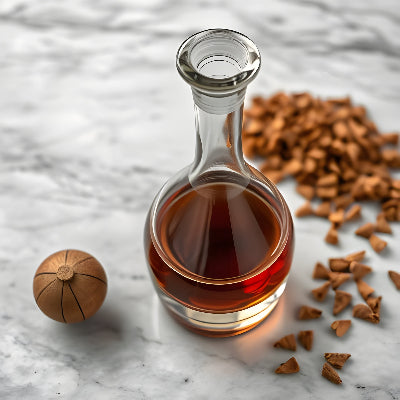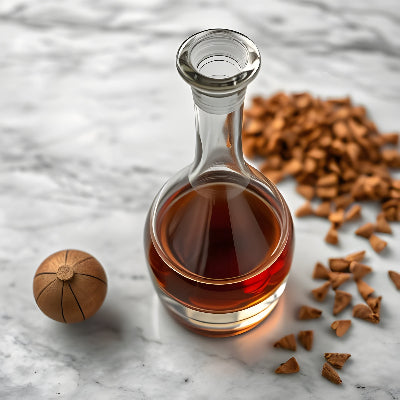Agarwood Oud
Agarwood Oud
Couldn't load pickup availability
Agarwood Oud – The Liquid Gold of Aromatic Resin
Discover the Mystique of Agarwood Oud
Agarwood Oud is revered across the globe, especially in the Middle East and parts of Southeast Asia, as one of the rarest and most treasured perfume ingredients known to humankind. Derived from the resinous heartwood of the agarwood tree—also known scientifically as Aquilaria—this aromatic resin is not only a sensory delight but also steeped in centuries of tradition, luxury, and mysticism. Whether used as essential oil, incense, or as a key note in fine fragrances, Oud remains an olfactory signature of timeless elegance.
What Is Agarwood?
Agarwood is formed when the Aquilaria tree, native to Southeast Asia, becomes infected by a particular type of mould. This infection initiates a natural defence mechanism, prompting the tree to produce a dense, dark resin to combat the invading fungus. Over time, the infected wood becomes enriched with this resin, transforming from a light-colored, soft wood into a dark, aromatic treasure. This richly resinous heartwood is what we call agarwood.
It is important to note that not all Aquilaria trees produce agarwood. Only a select few become infected under precise environmental conditions, which makes the resulting material exceedingly rare and valuable. The process is not only delicate but also highly time-consuming, often taking several years—sometimes decades—for the resin to fully mature within the tree.
Is Agarwood the Same as Oud?
In the world of luxury fragrance and aromatics, the terms agarwood and oud are often used interchangeably, but there is a subtle distinction worth clarifying for the discerning buyer.
-
Agarwood refers to the raw, resin-impregnated heartwood of the Aquilaria tree.
-
Oud, on the other hand, typically refers to the essential oil that is extracted from agarwood via a meticulous distillation process.
So while Oud comes from Agarwood, it is the concentrated form—often referred to as “liquid gold” due to its high value and rarity—that has become synonymous with luxury perfumery. The confusion arises because in the Middle East and South Asia, both terms are used interchangeably. However, understanding the difference is vital for fragrance connoisseurs and collectors.
The Distillation Process: From Wood to Oil
Extracting Oud essential oil from agarwood is a highly specialised art. Once the infected wood is harvested, it is cleaned and sorted based on resin content. The higher the resin concentration, the more potent the oil. The wood is then chipped and soaked in water to soften it and initiate fermentation.
Next, the chips undergo steam or hydro distillation, a process that can take days or even weeks to complete, depending on the desired quality of the oil. The result is a thick, dark, and deeply fragrant oil known as Oud.
This intricate distillation process contributes to the high cost and luxurious reputation of agarwood Oud. A small amount of high-quality Oud oil can command prices higher than gold per ounce.
What Does Agarwood Smell Like?
Trying to describe the smell of agarwood or Oud is like trying to explain a fine piece of music—words only go so far. The scent is profoundly rich, complex, and multi-layered. At first whiff, you may notice a sweet, resinous warmth mixed with a smoky, slightly woody aroma. As it settles, deeper notes emerge—think balsamic, leathery, earthy, and even animalic undertones.
These deep, sensual layers make Oud a favourite in Middle Eastern perfumery, where rich, evocative scents are held in high esteem. The smell of agarwood is often described as:
-
Woody and balsamic
-
Musky and slightly sweet
-
Smoky and earthy
-
Deeply spiritual and grounding
This multifaceted aroma makes it a prized base note in many high-end perfumes, capable of lasting for hours and evolving on the skin over time.
Cultural Significance in the Middle East and Beyond
Agarwood Oud is more than just a fragrance; it is a symbol of prestige, spirituality, and cultural heritage. In the Middle East, burning agarwood chips during important ceremonies or simply to scent the home is a common practice. The scent is said to elevate the atmosphere, promote tranquillity, and even ward off negative energy.
In countries like Saudi Arabia, the UAE, and Qatar, Oud perfumes are an integral part of daily life. Gifting Oud essential oil or agarwood chips is considered a generous and thoughtful gesture, especially during religious holidays and family gatherings.
Meanwhile, in Southeast Asia, especially in nations like Cambodia, Vietnam, and Malaysia—where the agarwood tree grows naturally—the harvesting and trade of agarwood have deep economic and cultural roots.
A Time-Consuming Rarity
One of the reasons Oud is so precious is the time-consuming nature of its formation and extraction. It can take a tree 20 years or more to produce enough resin to be commercially viable. Additionally, over-harvesting and the destruction of natural habitats have made wild agarwood even rarer. As a result, many Aquilaria trees are now cultivated in sustainable plantations, and artificial inoculation methods have been developed to stimulate resin production.
However, even with modern innovations, the artistry and time investment involved in producing high-quality agarwood Oud ensures it remains a luxury few can afford, and many desire.
Perfume Ingredients and Blending
In fine perfumery, Oud oil is considered a cornerstone for building complex, enduring scents. Its ability to blend harmoniously with florals, spices, musks, and amber makes it a versatile ingredient. Popular combinations include:
-
Oud and Rose: A classic Middle Eastern pairing with a rich, romantic profile.
-
Oud and Amber: Warm, inviting, and deep.
-
Oud and Saffron: Spicy, exotic, and vibrant.
-
Oud and Citrus: A modern twist balancing freshness with depth.
Because of its bold character, even a tiny amount of Oud can transform an entire fragrance composition, making it linger longer and evolve beautifully on the skin.
Sustainability and Ethical Harvesting
Due to the increased demand and the endangered status of some Agarwood tree species, sustainability has become a top concern in the industry. Reputable sellers and distillers now rely on responsibly managed plantations, ethical harvesting practices, and CITES certification to ensure compliance with international conservation standards.
Consumers are encouraged to buy only from trusted sources that prioritize environmental stewardship and ethical trade, ensuring that this aromatic resin can be enjoyed by future generations without harming its natural origin.
Conclusion: Why Choose Agarwood Oud?
In an era where synthetic fragrances dominate the market, Agarwood Oud stands as a testament to nature’s power, patience, and complexity. It is not just a perfume ingredient—it is a narrative of the forest, of resilience, of transformation.
-
You are experiencing the resinous heartwood of a rare tree that only reveals its true nature under duress.
-
You are inhaling the legacy of centuries of Middle Eastern perfumery and Southeast Asian tradition.
-
You are embracing an aromatic resin that has been time-consumingly distilled into one of the most coveted essential oils in the world.
Whether you are a fragrance aficionado, a spiritual seeker, or someone who simply appreciates the finer things in life, Agarwood Oud offers an unmatched sensory and cultural journey.
Share

Collapsible content
Processing & Delivery Info
Processing time up to 2-3 days
Delivery time up to 2-3 days (Unless express option is selected)

